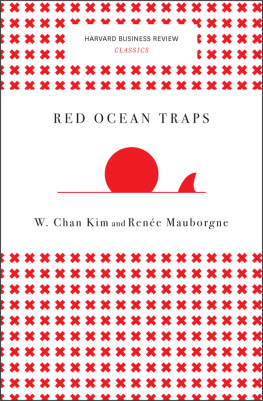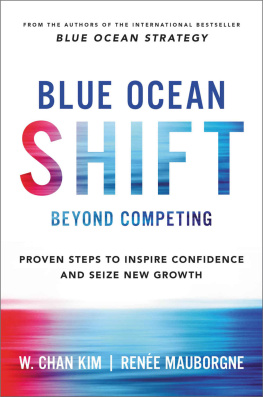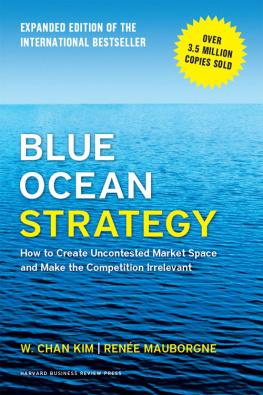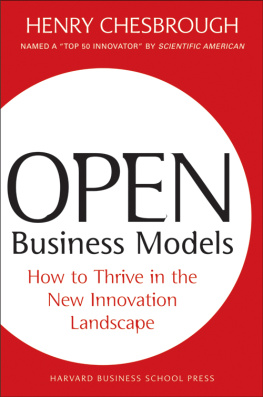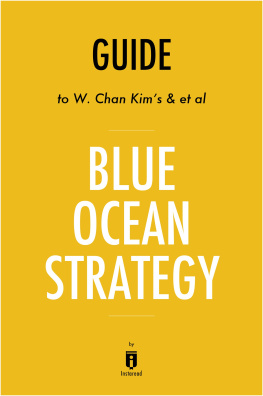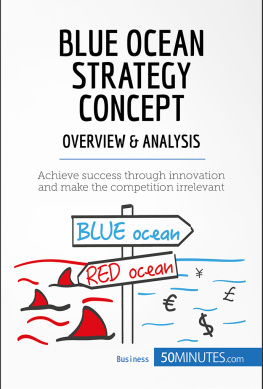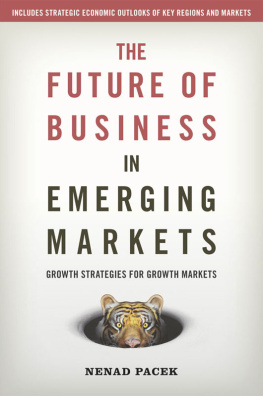RED OCEAN TRAPS
HARVARD BUSINESS REVIEW
CLASSICS
RED OCEAN TRAPS
The Mental Models That Undermine
Market-Creating Strategies
W. Chan Kim and
Rene Mauborgne
Harvard Business Review Press
Boston, Massachusetts
HBR Press Quantity Sales Discounts
Harvard Business Review Press titles are available at significant quantity discounts when purchased in bulk for client gifts, sales promotions, and premiums. Special editions, including books with corporate logos, customized covers, and letters from the company or CEO printed in the front matter, as well as excerpts of existing books, can also be created in large quantities for special needs.
For details and discount information for both print and
ebook formats, contact ,
tel. 800-988-0886, or www.hbr.org/bulksales.
Copyright 2017 Harvard Business School Publishing Corporation
Originally published in Harvard Business Review in March 2015
Reprint #R1503D
All rights reserved
No part of this publication may be reproduced, stored in or introduced into a retrieval system, or transmitted, in any form, or by any means (electronic, mechanical, photocopying, recording, or otherwise), without the prior permission of the publisher. Requests for permission should be directed to , or mailed to Permissions, Harvard Business School Publishing, 60 Harvard Way, Boston, Massachusetts 02163.
The web addresses referenced in this book were live and correct at the time of the books publication but may be subject to change.
Cataloging-in-Publication data is forthcoming.
ISBN: 978-1-63369-266-4
eISBN: 978-1-63369-267-1
THE HARVARD BUSINESS
REVIEW CLASSICS SERIES
Since 1922, Harvard Business Review has been a leading source of breakthrough ideas in management practicemany of which still speak to and influence us today. The HBR Classics series now offers you the opportunity to make these seminal pieces a part of your permanent management library. Each volume contains a groundbreaking idea that has shaped best practices and inspired countless managers around the worldand will change how you think about the business world today.
In America, corporate performance has been deteriorating for decades. According to Deloittes landmark study The Shift Index, the aggregate return on assets of U.S. public companies has fallen below 1%, to about a quarter of its 1965 level. As market power has moved from companies to consumers, and global competition has intensified, managers in almost all industries have come to face steep performance challenges. To turn things around, they need to be more creative in developing and executing their competitive strategies. But long-term success will not be achieved through competitiveness alone. Increasingly, it will depend on the ability to generate new demand and create and capture new markets.
The payoffs of market creation are huge. Just compare the experiences of Apple and Microsoft. Over the past 15 years, Apple has made a series of successful market-creating moves, introducing the iPod, iTunes, the iPhone, the App Store, and the iPad. From the launch of the iPod in 2001 to the end of its 2014 fiscal year, Apples market cap surged more than 75-fold as its sales and profits exploded. Over the same period, Microsofts market cap crept up by a mere 3% while its revenue went from nearly five times larger than Apples to nearly half of Apples. With close to 80% of profits coming from two old businessesWindows and Officeand no compelling market-creating move, Microsoft has paid a steep price.
Of course, its not that companies dont recognize the value of new market spaces. To the contrary, their leaders increasingly are committed to creating them and dedicate significant amounts of money to efforts to do so. But despite this, few companies seem to crack the code. What, exactly, is getting in their way?
In the decade since the publication of the first edition of our book, Blue Ocean Strategy, weve had conversations with many managers involved in executing market-creating strategies. As they shared their successes and failures with us, we identified a common factor that seemed to consistently undermine their efforts: their mental modelsingrained assumptions and theories about the way the world works. Though mental models lie below peoples cognitive awareness, theyre so powerful a determinant of choices and behaviors that many neuroscientists think of them almost as automated algorithms that dictate how people respond to changes and events.
Mental models have their merits. In dangerous times, a robust mental model can help you quickly make decisions that are critical to survival. And we have no issue with the soundness of the mental models that we saw managers apply. They were grounded in knowledge acquired in classrooms and from years of business experience. They help managers respond better to competitive challenges. But our conversations suggest that the mental models managers rely on to negotiate existing market spaces also undermine their ability to create new markets.
In our research and discussions, weve encountered six especially salient assumptions built into managers mental models. We have come to think of them as red ocean traps, because they effectively anchor managers in red oceanscrowded market spaces where companies engage in bloody competition for market shareand prevent them from entering blue oceans, previously unknown and uncontested market spaces with ample potential. The first two traps stem from assumptions about marketing, in particular an emphasis on customer orientation and niches; the next two from economic lessons on technology innovation and creative destruction; and the final two from principles of competitive strategy that regard differentiation and low cost as mutually exclusive choices. In the following pages, well look at each trap in detail and see how it thwarts companies attempts to create markets.
TRAP ONE: SEEING MARKET-CREATING STRATEGIES AS CUSTOMER-ORIENTED APPROACHES
Generating new demand is at the heart of market-creating strategies. It hinges on converting noncustomers into customers, as Salesforce.com did with its on-demand CRM software, which opened up a new market space by winning over small and midsize firms that had previously rejected CRM enterprise software.
The trouble is that managers, especially those in marketing, have been quite reasonably brought up to believe that the customer is king. Its all too easy for them to assume, therefore, that market-creating strategies are customer led, which causes them to reflexively stick to their focus on existing customers and how to make them happier.
This approach, however, is unlikely to create new markets. To do that, an organization needs to turn its focus to noncustomers and why they refuse to patronize an industrys offering. Noncustomers, not customers, hold the greatest insight into the points of pain and intimidation that limit the boundary of an industry. A focus on existing customers, by contrast, tends to drive organizations to come up with better solutions for them than what competitors currently offerbut keeps companies moored in red oceans.
Consider Sonys launch of the Portable Reader System (PRS) in 2006. The companys aim was to unlock a new market space in books by opening the e-reader market to a wide customer base. To figure out how to realize that goal, it looked to the experience of existing e-reader customers, who were dissatisfied with the size and poor display quality of current products. Sonys response was a thin, lightweight device with an easy-to-read screen. Despite the medias praise and happier customers, the PRS lost out to Amazons Kindle because it failed to attract the mass of noncustomers whose main reason for rejecting e-readers was the shortage of worthwhile books, not the size and the display of the devices. Without a rich choice of titles and an easy way to download them, the noncustomers stuck to print books.
Next page
